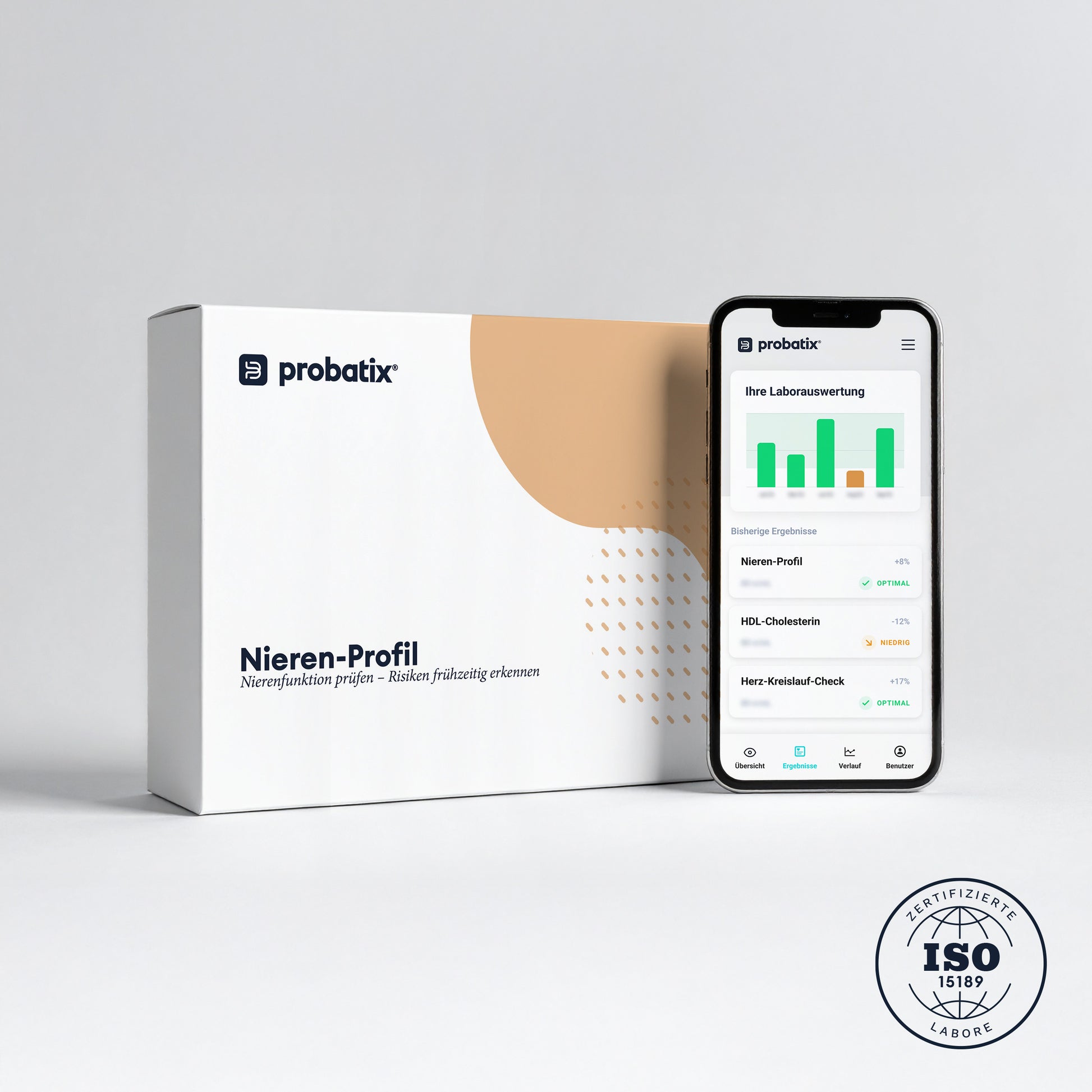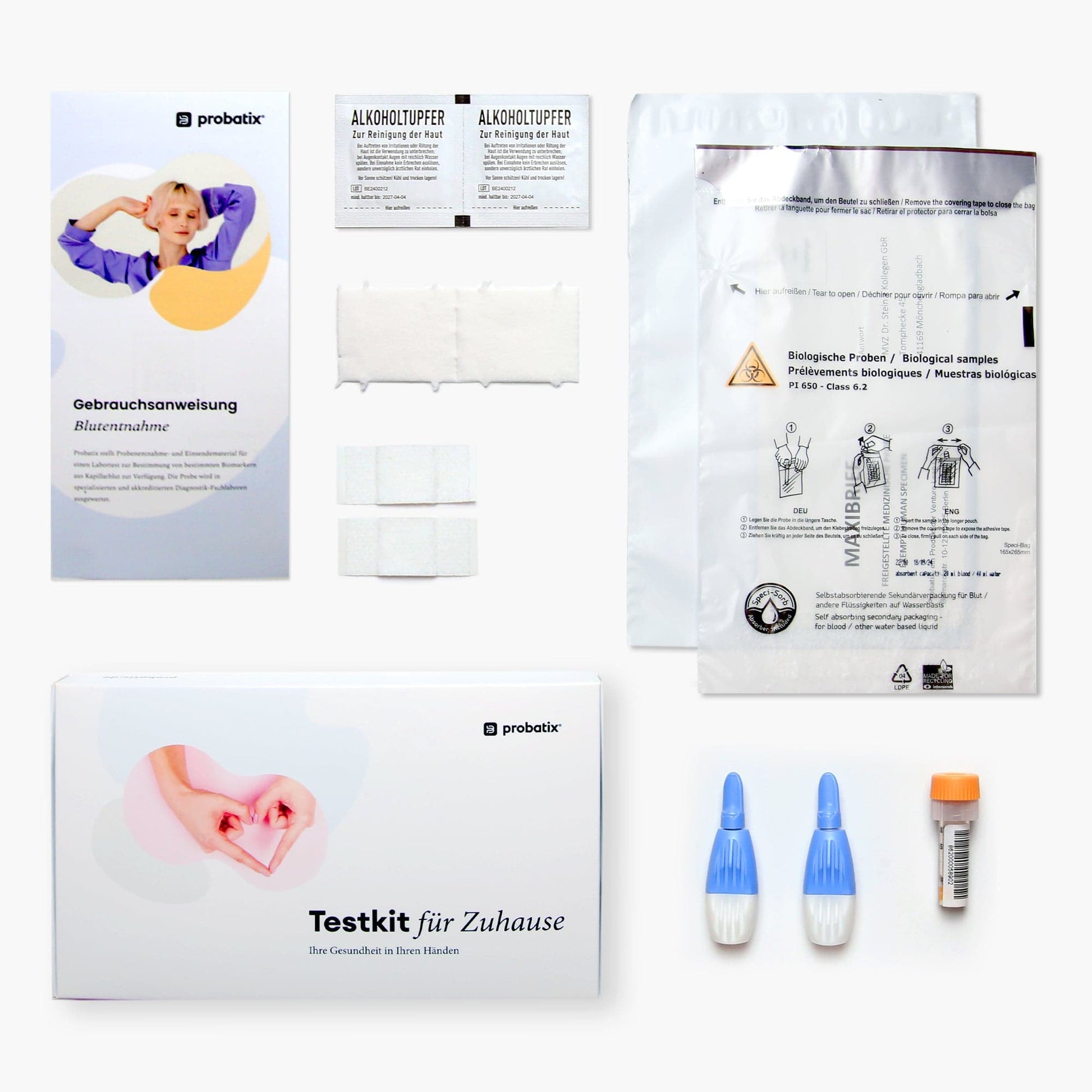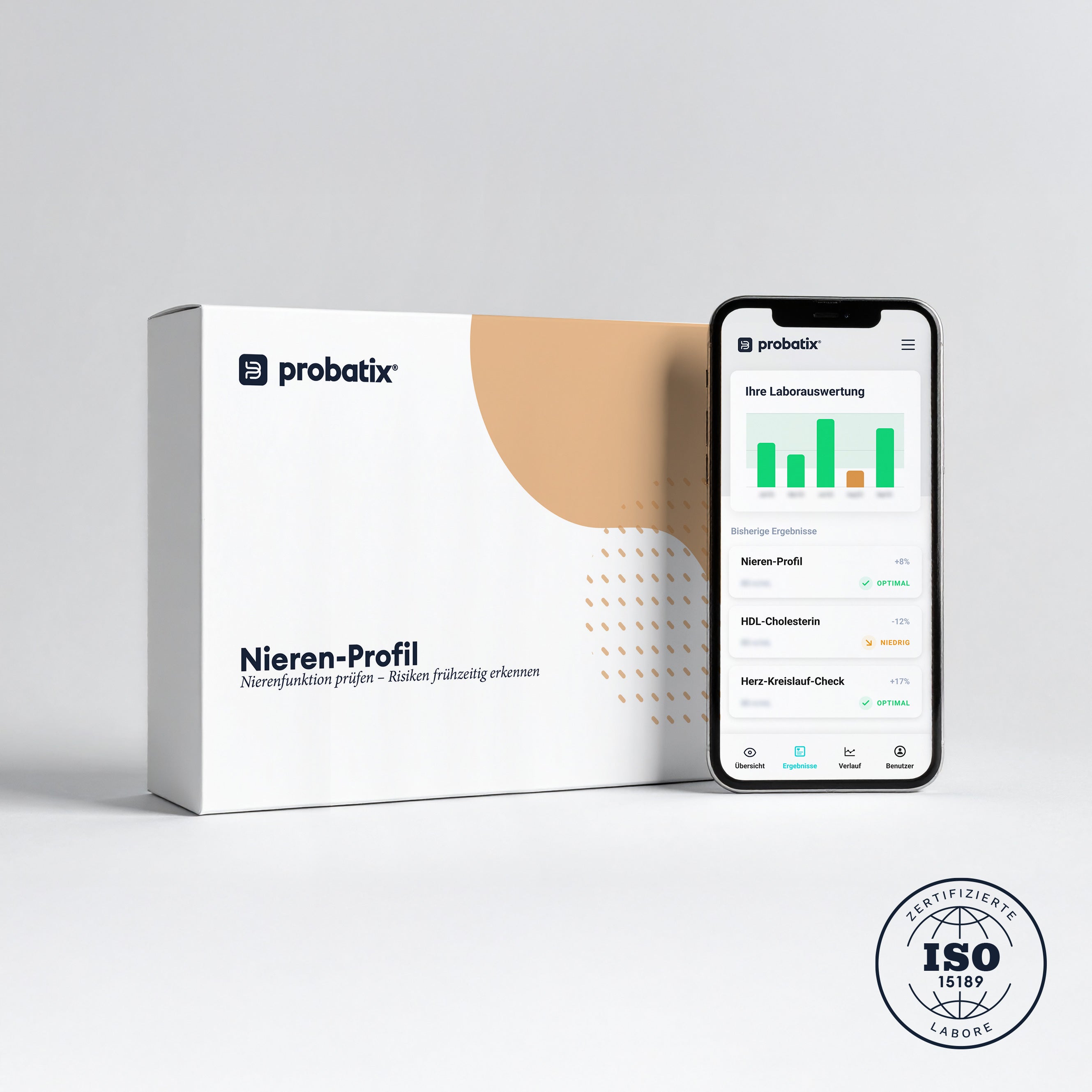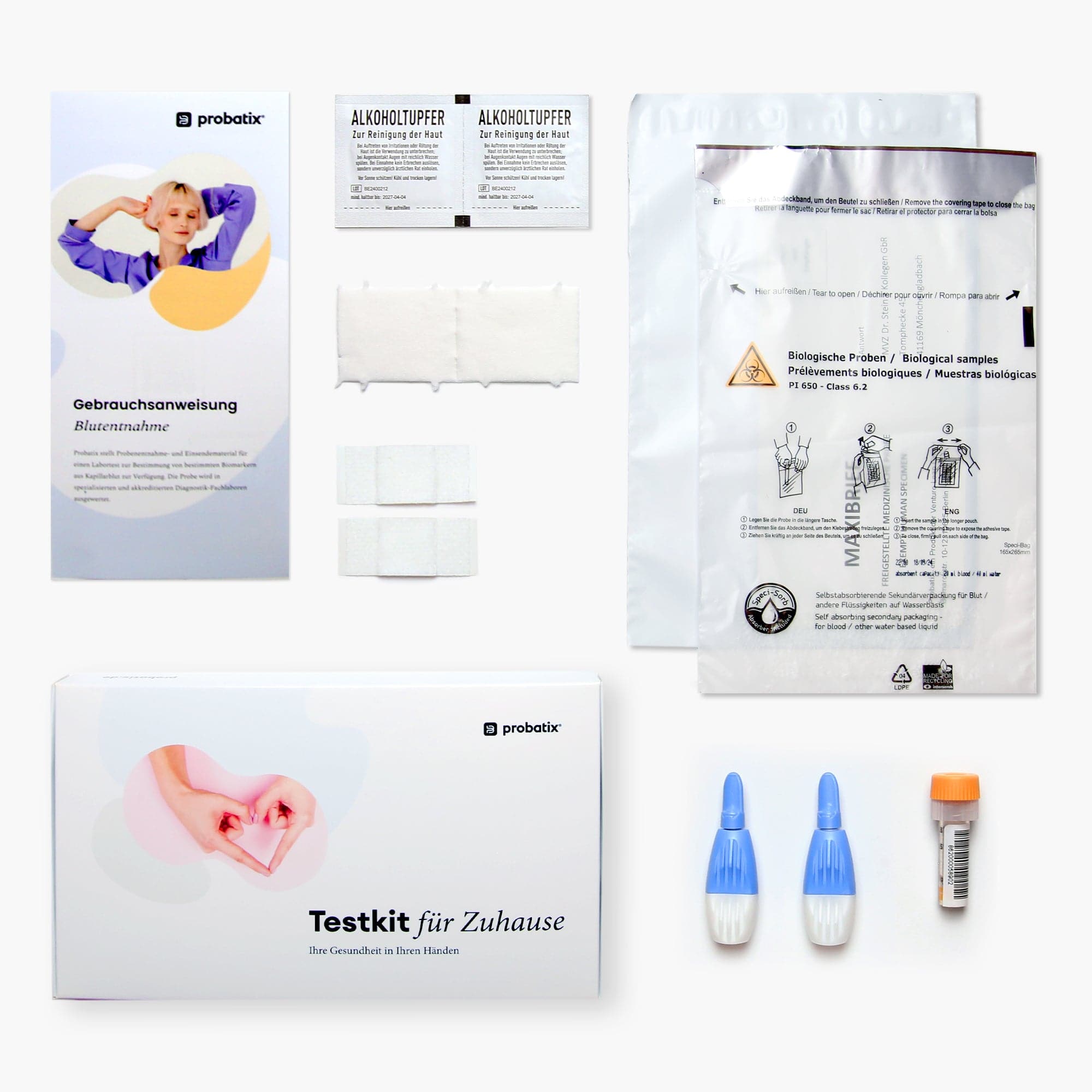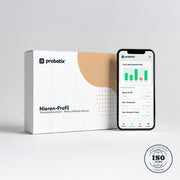Kidney Status
Kidney Status
Your kidneys play a crucial role in detoxifying your body – the Kidney Check provides you with clarity.
- Important kidney markers: Measures uric acid, urea, sodium, creatinine, and NT-proBNP to assess kidney function.
- Early detection made easy: Identifies potential kidney performance limitations and supports targeted health care.
- Convenient & reliable: Simple sample collection from home with professional lab analysis.
This way, you can detect early if your kidneys need support.
In stock
What values does this test measure?
What values does this test measure?
Further information on the values can be found here.
How does it work?
How does it work?
1. Take a sample with our test kit
2. Send the sample to the lab with the prepaid envelope
3. View results digitally after a few days
Why are the values reliable?
Why are the values reliable?
All tests offered by us are evaluated and validated in certified medical laboratories in Germany.
This is what the press says about our tests
Kidney Status: All details about the test
What benefits does this test offer me?
What benefits does this test offer me?
Fill in the text content of the collapsible item here. You can provide details and explanation for the question here.
The kidneys play a central role in your body: They filter the blood, regulate the water and electrolyte balance, and excrete waste products. Impaired kidney function often goes unnoticed for a long time, as symptoms only appear in advanced stages. With the Kidney Check , you gain valuable insights into your kidney health.
The test analyzes the following important kidney markers:
- Uric Acid: Elevated levels may indicate gout or impaired kidney function.
- Urea: Formed during the breakdown of proteins and excreted by the kidneys. Elevated levels may indicate impaired kidney performance.
- Sodium: A vital electrolyte essential for fluid balance and kidney function. html
- Creatinine: A waste product of muscle metabolism that is excreted by the kidneys. High levels can indicate kidney dysfunction.
- NT-proBNP: A marker for heart and kidney function. Elevated levels may indicate heart overload or reduced kidney performance.
Why is this test important?
The kidneys filter about 50 liters of blood daily and are crucial for the elimination of toxins. Impaired kidney function can develop gradually and lead to serious health problems in the long term. Regular tests help detect changes early and prevent potential diseases.
Convenient & reliable test execution
With the Kidney Check , you can conveniently check your kidney function from home. Sampling is easily done using capillary blood from the fingertip. The analysis is conducted in a certified specialist laboratory , ensuring you receive precise and reliable results.
What do the measured values mean?
What do the measured values mean?
Fill in the text content of the collapsible item here. You can provide details and explanation for the question here.
Creatinine is a breakdown product of muscle metabolism that is filtered out of the blood by the kidneys. The creatinine level provides information about kidney function, with elevated levels potentially indicating a kidney dysfunction.
Urea
Urea is an end product of protein metabolism and is excreted through the kidneys. Its value indicates how well the body breaks down excess proteins and provides important information about kidney function and metabolism.
Uric acid
Uric acid is a breakdown product of purines, which come from food or cells. An elevated level can not only lead to painful gout attacks but also indicate a metabolic imbalance that can strain the kidneys and joints in the long term.
Sodium
Sodium is an important mineral and electrolyte that regulates the body's water and salt balance. It also plays a central role in nerve signal transmission and muscle function. The body usually maintains sodium levels within a narrow range to keep essential functions stable.
Excessive levels (hypernatremia) often occur with fluid deficiency and can trigger thirst, confusion, or seizures. Low levels (hyponatremia) can result from significant fluid loss, kidney problems, or certain medications, leading to weakness, headaches, and, in extreme cases, consciousness disorders.
NT-proBNP
NT-proBNP is a highly sensitive marker for heart health, which is elevated in cases of heart stress, such as heart failure or stress. This value helps to detect problems early, before symptoms occur, and supports targeted treatment.
Why is this test important?
Why is this test important?
Fill in the text content of the collapsible item here. You can provide details and explanation for the question here.
The kidneys are essential for the detoxification of the body and the regulation of fluid and electrolyte balance. An unnoticed impairment of kidney function can lead to serious health problems in the long term. The Kidney Check helps you keep an eye on your kidney values and detect potential problems early.
When should I take this test?
When should I take this test?
Fill in the text content of the collapsible item here. You can provide details and explanation for the question here.
- html
- In case of persistent fatigue or concentration problems.
- If you suffer from high blood pressure or diabetes .
- With a family history of kidney diseases.
- If you have an increased protein intake (e.g., due to a special diet or intensive training).
- For regular health check-ups, especially from the age of 50.
An early check can help identify health risks in a timely manner and take targeted countermeasures.
What is included in the test kit?
What is included in the test kit?
Where can I find the instructions?
Where can I find the instructions?
Fill in the text content of the collapsible item here. You can provide details and explanation for the question here.
Die Anleitung für diesen Labortest finden Sie auf Instructions: Capillary Blood Tests.Bei Fragen hilft Ihnen auch immer gerne unser wunderbarer Support weiter: support@probatix.de
FAQ - More Frequently Asked Questions about the Test
FAQ - More Frequently Asked Questions about the Test
Fill in the text content of the collapsible item here. You can provide details and explanation for the question here.
What is examined in the kidney check?
The test measures key kidney values such as uric acid, urea, sodium, creatinine , and NT-proBNPto assess the detoxification and filtration function of the kidneys.
Who is this test suitable for?
The kidney check is ideal for individuals with risk factors such as high blood pressure, diabetes, or a family history of kidney disease, as well as for anyone who wants to regularly monitor their kidney function.
How does the sampling work?
The sampling is simple and painless, using capillary blood from the fingertip. You will receive a test kit with clear instructions for easy home use.
How long does it take to receive my results?
After sending in the sample, you will typically receive your lab results digitally within 3–5 business days.
What does the creatinine level indicate about my kidney function?
Creatinine is a waste product of muscle metabolism and is excreted by the kidneys. Elevated levels may indicate impaired kidney function.
What does an elevated urea level mean?
Urea is produced during the breakdown of proteins and is excreted by the kidneys. An elevated level may indicate kidney dysfunction or a high protein intake.
How reliable are the results?
The analysis is conducted in a certified specialist laboratory according to the highest medical standards, ensuring you can rely on precise and reliable results.
What happens if my values are outside the reference range?
If abnormalities are detected, you should discuss the results with a doctor.He may recommend further investigations or targeted measures.
Das sagen unsere Kunden
